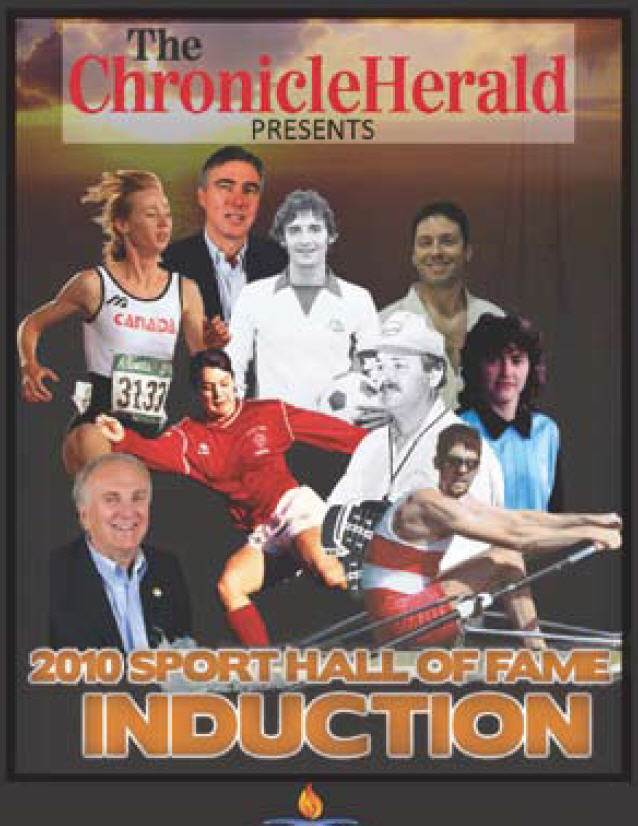I have been given the task of starting our own Karate Hall of Fame. This will follow the same criteria as the Nova Scotia Sport Hall of Fame. We will finally recognize the pioneers, athletes and contributors to Karate in this Province. Anyone in KNS can nominate someone to this Hall of Fame but they must supply all information including pictures, history, newspaper articles and letters of support. More information will be available in the coming weeks.
Victor Swinimer
Bridgewater N.S.
SportsNS – Gary Sabean Inducted into the Nova Scotia Sport Hall of Fame
On October 30th, 2010 … Gary Sabean became the first karate athlete to ever be inducted!!
KNS and its members congratulate you!
Vist SportsNS website for more info.
Article from the Digby Courier

Gary Sabean: The Importance of Learning from Losses
Taken from the Nova Scotia Sports Hall of Fame
Discipline and respect: according to 4th degree black belt Gary Sabean, these are the qualities that set karate apart from other sports. Throughout his 14 year athletic career, Gary Sabean has shown the utmost discipline and respect for his sport; however, initially, he had no interest in karate at all. It was his first competition, at which he did horribly, that inspired him to try harder and commenced his love for karate. Gary may have started off slow, but his reputation quickly grew to precede him. Those who know Gary consistently describe him as personable, kind-hearted, and dedicated. Former manager of the NS provincial karate team, Ellen Waterfield, sums Gary up by saying that “his humility and success [are] the perfect combination, and his humour [is] a gift”.
Gary has managed to obtain the title of Canadian Champion in the under-75kg division not once, but nine times— seven of those times consecutively from 1997-2003. In 1999, he not only claimed first place in the middle weight class, but he took home the title of open weight champion as well. Gary has even obtained first place honours worldwide in competitions with over 100 participating countries, winning gold in sparing at the 2001 World Chito-Ryu Karate Championship and being named the Grand Champion in forms and sparing at the same tournament in 2004.
Gary’s feats are not purely physical accomplishments. Mentally, Gary maintains a very positive attitude, stating that you can “always learn something in Karate” no matter how many times you compete, whether you win or lose. He remembers that, after each national tournament, losing was an opportunity to focus on improvement and winning was simply encouragement to try harder and do better. Even the disappointment of being unable to compete only prompted Gary to try harder. Gary was mentally psyched to fight against the defending world champion, when he suffered a broken jaw two days before the scheduled match and had to return home. He trained while his jaw was healing and, against doctor’s orders, went to nationals where he had one of his eyelids split open during a fight. Gary opted to have his eye sewn up ring-side so that he might finish without disqualification. His determination caused him to complete the championship in first place, taking home his ninth Canadian title despite his injuries.
Karate, as a low-profile sport, doesn’t always get the support that it deserves, but Gary has proven that a small team like the Nova Scotia Karate Association can win titles at a national level. As a competitor, Gary Sabean earned such prestigious titles as National Athlete of the Year (2000), winner of the overall sportsmanship award at a national tournament, and, after his retirement, he continued to be an active force in the sport of karate, earning the distinction of National Coach of the Year in both 2007 and 2009. “Karate needs people like Gary who stick with the sport and then pass it on”, says Dave Kelly, former NSKA president. Gary started giving back to his sport by initiating development programs with his close friend Mitchell German. Gary has always been especially interested in junior programs because, he says, “the juniors believe they can achieve anything”.
Gary currently puts his teaching skills to good use as a coach for the National team and as head coach for the Alberta team. He has just commenced teaching a four-to-six-year-old karate class and the first thing he covers with his students is bowing. Gary, a true ambassador of his sport, explains his teaching methods by reminding us that “karate begins and ends with respect.”